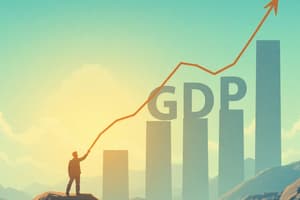Podcast
Questions and Answers
What is a primary focus of macroeconomics?
What is a primary focus of macroeconomics?
- Individual consumer behavior
- Personal savings rates
- Overall economic aggregates (correct)
- Microeconomic market fluctuations
Which of the following questions is NOT typically addressed by macroeconomics?
Which of the following questions is NOT typically addressed by macroeconomics?
- What causes unemployment rates to fluctuate?
- Why are some countries experiencing rapid economic growth?
- How can inflation be controlled?
- What determines consumer preferences? (correct)
What is one potential solution for reducing extreme poverty discussed in macroeconomics?
What is one potential solution for reducing extreme poverty discussed in macroeconomics?
- Restricting international trade
- Implementing universal basic income (correct)
- Reducing government spending
- Increasing corporate taxes
Which factor is most closely associated with rising inflation?
Which factor is most closely associated with rising inflation?
How does macroeconomics typically analyze unemployment trends?
How does macroeconomics typically analyze unemployment trends?
Which of the following best defines national income in the context of macroeconomics?
Which of the following best defines national income in the context of macroeconomics?
What is likely to happen during a recession, according to macroeconomic theory?
What is likely to happen during a recession, according to macroeconomic theory?
What is a major challenge in formulating fiscal policies to control economic fluctuations?
What is a major challenge in formulating fiscal policies to control economic fluctuations?
What is typically a result of fluctuations in aggregate demand?
What is typically a result of fluctuations in aggregate demand?
Which variable is essential for understanding the rate of growth in an economy?
Which variable is essential for understanding the rate of growth in an economy?
Study Notes
Overview of Macroeconomics
- Macroeconomics, studied prominently by John Maynard Keynes, emerged in response to the Great Depression.
- Defined both as a Policy Science and a public good, as its outcomes benefit the entire economy without individual cost.
Importance of Studying Macroeconomics
- Self-Interest: Understanding macroeconomics enhances individual participation in the economy.
- Cultural Literacy: Informs understanding of macro issues like inflation and unemployment, aiding in better decision-making.
- Common Welfare: Empowers future leaders to develop policies that enhance the general well-being of society.
- Civic Responsibility: Essential for grasping policy issues and implications of different governmental policies.
Macroeconomic Sectors
- The economy consists of four main sectors:
- Household
- Business
- Government
- Foreign
- These sectors are key actors influencing gross domestic product (GDP) through aggregate expenditures.
Functions of Macroeconomics
- Provides insights into the functioning of complex economic systems and the roles of aggregate demand and supply in determining national income and employment.
- Analyzes forces that drive a country's economic growth, identifying paths to sustain high growth levels.
- Offers policy suggestions for controlling inflation and deflation, thus addressing broader macroeconomic issues.
- Explores balance of payments and identifies causes of deficits while proposing corrective measures.
- Aids in resolving economic challenges such as poverty, unemployment, and inflation through macro-level solutions.
Key Questions Addressed by Macroeconomics
- Investigates the causes of poverty and policies to promote economic growth.
- Examines unemployment factors and seeks solutions to mitigate them.
- Addresses how to combat inequality and extreme poverty.
- Analyzes factors causing rising living costs.
- Explores disparities in economic growth rates among countries.
- Investigates variations in inflation rates and price stability.
- Studies the cyclical nature of recessions and depressions, investigating government policy roles in mitigating their impact.
Key Variables in Macroeconomic Study
- Output: Refers to overall production levels and growth rates in the economy.
- Inflation: Measures the rate at which average price levels rise over time.
Conclusion
- Macroeconomics examines major economic issues, providing data-driven theories to understand elements like national income, savings, investment, employment, demand supply, and price levels.
- The discipline focuses on identifying fluctuations in these aggregates and devises strategies for stabilizing the economy.
Studying That Suits You
Use AI to generate personalized quizzes and flashcards to suit your learning preferences.
Related Documents
Description
Explore the fundamental concepts of macroeconomics and its significance in understanding the economy. This quiz delves into the impact of Keynesian economics, especially during the Great Depression, and highlights the importance of cultural literacy and self-interest in economic participation.




